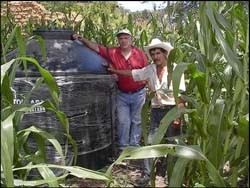
For many years, twenty-six-year-old José Santos Pérez practiced slash and burn agriculture on his farm in Mapulaca, Lempira in Honduras – depleting his land and producing less each time. Like many rural farmers in Honduras, Pérez did not know any other methods of farming and used the same traditional practices that have been used for generations.
Living conditions for Pérez and his family were also very difficult due to the lack of work, poor nutrition, and almost no health care or education. They barely survived planting corn and sorghum with minimum yields. In spite of hard work in the fields, no one in his village was getting ahead; most lived day to day with no hope of their situation improving.
Pérez’s life began to change when USAID and CARE International arrived in his village in 1998. Along with his wife, José started participating in USAID’s Title II Food Security program. Through this support, Pérez learned how to improve the way he planted crops and set up a rotating seed and tool bank - of which José became the president for three years. As a promoter and producer, he received training in various farming techniques such as integrated pest management, installing plant barriers to protect his crops, soil conservation, agro-forestry, drip micro-irrigation, seed selection, and administrative controls.
The Title II program works to improve the food security of vulnerable populations in extremely poor municipalities of western Honduras where there are approximately 5,000 beneficiaries a year. It is implemented by CARE International in Honduras in partnership with the Government of Honduras. It consists of three components: community based health centers, a food security extension project, and a rural development and employment generation project.
Through this training, Pérez learned the importance of not burning his fields and how to care for his land. He now has two farms of a half hectare each. In 2002, CARE evaluated his farm for installing a micro-irrigation system, which cost $88. He obtained the materials from the rotating seed and tool bank and is paying it back little by little. Pérez was also able to install a solar pump, which allows him to raise water from a nearby stream to a 5,000 gallon storage tank. The water in the tank flows through micro-irrigation pipes to water his field.
Pérez’s crops now include cashews, pineapples, peanuts, jicama, cassava, watermelon, cucumber, and corn. He is particularly interested in peanuts and fruit trees, which have a high value in the market. He plants three crops a year and produces more than he needs to feed his family. He can now sell some of the excess to pay off the micro-irrigation system and buy other things his family needs.







Comment
Make a general inquiry or suggest an improvement.